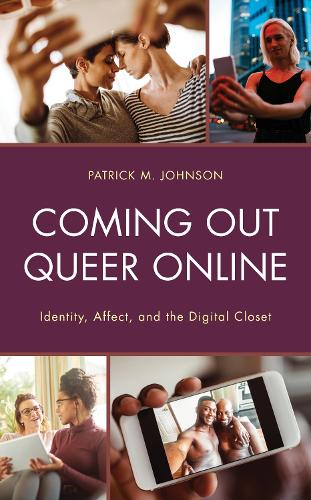
Coming Out Queer Online: Identity, Affect, and the Digital Closet
(Hardback)
Available Formats
Publishing Details
Coming Out Queer Online: Identity, Affect, and the Digital Closet
By (Author) Patrick M. Johnson
Bloomsbury Publishing PLC
Lexington Books
3rd August 2020
United States
Classifications
Professional and Scholarly
Non Fiction
Gender studies, gender groups
Media studies
306.76
Physical Properties
Hardback
144
Width 160mm, Height 230mm, Spine 17mm
395g
Description
The Digital Closet: LGBT*Q Identities and Affective Politics in a Social Media Age discusses how LGBT*Q individuals occupy a precarious space within society as a marginalized community in the United States. They are afforded representation in some venues yet are often invisible. Through social media, LGBT*Q individuals have sought new ways to forge communities and increase their visibility. This rise in visibility afforded individuals means to seek out and distribute information to help in the coming out process. Combining archival research, observation, interviews, and visual discourse analysis of social media feeds, the Patrick Johnson examines the role social media plays in expressions of LGBT*Q politics, culture, and coming out. Despite the messages not having changed fundamentally, the improved access to LGBT*Q stories have amplified the ones that are sent. Johnson argues that this is positive in acting as intervention for LGBT*Q suicide rates, hate crimes, and discrimination from the outside. However, the author also contends that it has vastly re-centered and prioritized white, cisgender, masculinity, obscuring other stories and creating potentially dangerous environments for POC, women, trans* individuals, and gay men who do not meet this high standard of masculinity. Scholars of gender studies, media studies, and queer theory will find this book particularly interesting.
Reviews
Coming out Queer Online: Identity, Affect, and the Digital Closet addresses how difficult it can be for LGBT*Q+ people to come out online. Some may be scared of perceptions and how their family and loved ones may receive it.... [R]eaders will be able to see that there is representation with the LGBT*Q+ group and will be able to see how the digital age has helped change that for the better.
Author Bio
Patrick M. Johnson is assistant professor and program coordinator for the Department of Communication at Indiana University Northwest.
